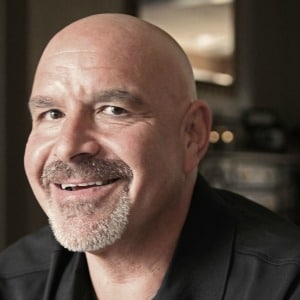
Eric Mastel is the Market Manager for Cumulus in Savannah. He’s also one of Radio Ink’s Best Managers for 2017. Mastel got his first job in radio as an AE, got handed the phone book and some cassettes called, “tiger tapes”, 33 years ago. His first managers position was GSM for WKFM in Syracuse in 1987. Mastel received more nominations from his employees than any other manager on our 2017 list. Here’s what just a few of his employees said about him, followed by our extended interview with Eric, which everyone reading this today will want to print out and tape to their office wall. The information he provides is worth way more than those “tiger tapes” from 33 years ago.
From one his PD’s: “Eric is smart, organized, fair.. and one of the Best GM’s ever worked with in radio.” From another employee: Eric is by far one of the BEST managers in radio. He understands that everyone, including himself, has a job that must be done. He understands the importance of everyone’s positions and he gives us ample space and opportunity to succeed without pressure or intimidation. It is a pleasure working with him on a daily basis. We are a successful market because of our market manager.” And yet another: He knows how to be a role model and manage people and yet give every employee the space they need to grow into the best sales person, program director, DJ or any other position they can excel in. He makes coming to work enjoyable and it is certainly a family of people working hard, enjoying their job and being proud to be part of Eric Mastel’s team.”
Our Best Managers list will be revealed on October 9. Here’s our extended interview with one of Radio’s best, Eric Mastel.
Radio Ink: How have you been able to achieve the success you have so far in radio?
Eric Mastel: It really is all about the people. When I was running the radio division for Max Media, Gene Loving the CEO had a model of a bus on the conference room table. As we were growing the company, he would always ask, “Do we have the right people on the bus to get us where we need be?” You would be surprised at how simplistic yet effective that concept is when making hiring and staffing decisions. Instinctively, many of us know that without the right people on the bus, success is much more difficult to achieve. The bus metaphor helps to streamline that thought process.
Radio Ink: Who mentored you, and what did they do to help you succeed?
Eric Mastel: There are several people in my career that I would consider to have been mentors. I have always tried to learn something from everyone I have ever worked for or with. Chet Walker, a.k.a. “Big Jim Roberts,” was my first GM at WQNY in Ithaca, New York. He showed me how radio works, the passion for the brands and the fun we can have while entertaining and helping people. Jay Sterin, WKFM in Syracuse, really taught me the business side of the business, the economics of radio, and setting goals and expectations. From Barry Drake, Sinclair Broadcast Group, I understood the minutia of details and numbers. Focus on the small things, data points, (closing ratios, average order size, number of assets included, etc.) and big things, budgets, growth, and success take care of themselves. When I was with Entercom, David Field regularly demonstrated his genuine concern for his staff and the communities which we serve. Dick Lamb, Larry Saunders, and John Trinder with Max Media, allowed me to take all my previous experiences and meld them together to develop my own management style. With their guidance, I became a “melting pot” of all the people that have helped guide me along the way. I will be forever grateful. I know I have left some people out and want to thank all the people I came into contact with in my 33 years in radio.
Radio Ink: What do you expect from the people you manage?
Eric Mastel:
Get involved. There’s no excuse for not taking responsibility when you see a problem growing. I count on my staff to accept responsibility and seek solutions for things that go wrong and give credit for positive developments. I expect them to have the courage to deliver bad news.
Generate ideas. A common frustration is a lack of ideas. A person who is innovative and creative is a pearl to be treasured. I want to hear what they have to say; it’s my job to sift through ideas and decide which ones have merit. Often the best ideas sound crazy at first.
Be willing to collaborate. It’s surprising how many people still resist collaboration or sharing credit, even though we know how much more we can achieve when we bring everyone to the table at once. There can be very practical reasons for this—for example, it may not be in someone’s financial interest to cooperate. But I expect people to trust that I will notice when they take an action.
Be willing to lead initiatives. There’s no way of knowing how a challenging new project will turn out, so people are often reluctant to be associated with an untested idea. They duck under the radar screen rather than risk going up in flames. But I want people to raise their hands.
Develop leaders as you develop. Too many people are selfish about their development. I want my direct reports to take as much interest in their subordinates’ development as they do in their own—if not more.
Stay current. There’s nothing more depressing than sitting in a meeting with people who don’t know what’s going on in the world. I expect people to read, to watch the news—not just because it makes them more interesting but because what happens in the world affects what happens to us, to our marketplace, and to our competition.
Drive your own growth. I expect people to seek perpetual education and development—not necessarily by going back to school but by exposing themselves to new people and ideas.
Be a player for all seasons. It’s one thing to sustain the behaviors I’ve described in good times. It’s easy to collaborate, to stick up your hand, to offer ideas, when sales and earnings are growing by 20% a year. But how do you behave when they’re in decline? I expect positive behaviors no matter what, and people who can live up to that stand out in my eyes. I always look for someone who can thrive in either circumstance, and I’m amazed at the number of people who can’t.
Radio Ink: When do you know you have a great employee who has the potential to become a manager?
Eric Mastel: They’re already doing the role. One of the greatest indicators of a successful promotion is if they are already doing the role above theirs, and doing it well.
They ask for it.
This doesn’t mean simply stating they want a promotion, but take note of how they ask for it. Do they say, “I want to be promoted,” or do they ask what needs to be done now so that they can receive a promotion in the near future?
They have a high level of emotional intelligence.
If the employee is great at their job, meaning they have the skills necessary to effectively do the role, that’s one thing, but if they have a high level of emotional intelligence, that’s another. Having EI means that the employee is able to connect with various personalities, have empathy for co-workers and clients, and that they are self-aware.
They don’t complain.
Even when their plates are full, if someone asks for their help, they do it with a smile on their face. They understand the end goal is to help the company grow, and they are willing to go above and beyond, breaking down walls, to get stuff done.
They provide creative solutions.They are bringing new ideas and creative solutions to improve business, constantly trying to think of ways to make things better even if it’s not in their job description.
They’re involved in the culture.
Promoting someone means investing in them and their future with the organization. If someone is not only producing but also contributing to the company culture, that means they are invested—and they should be recognized for balancing the two.
Radio Ink: What is the number one challenge you face every day as a manager, and how are you overcoming it?
Eric Mastel: That’s a funny question, I don’t think we have just one major challenge affecting us daily. Some of the challenges that tend to consume my day include, but are not limited to:
– Keeping radio relevant to clients and media buyers. Cumulus Best Buy and Why presentation goes a long way to shoring up the perception of radio.
– Keeping radio live and local, entertaining and informing the communities that license us. All with more voice tracking, more syndication, and less local staff then ever.
– Understanding, explaining, and selling the new digital products that we have recently taken to market. This is critical if we want to grow our business.
– Investing in infrastructure and equipment. We have cut budgets for so long and so deep that everything from the building to the equipment is inconsistent at best.
– Recruiting young people into a business that is perceived as old and uncool.
– Doing so much more with so much less, all while keeping a positive attitude, a smile on your face, a cheery disposition, a firm hand, innovating, learning and improving everyday.
Radio Ink: Tell us what your biggest/most proud moment at the station or cluster was over the past 12 months.
Eric Mastel: There are quite a few things to be extremely proud of. The two that come to mind most readily are: The way the entire staff rallies when faced with adversity. Savannah is experiencing a decline in automotive spending in 2017. That precipitated the very first missed quarterly budget in over three years. The programmers got involved and came up with new sales ideas, promotions went to work on additional events that we could sell, and of course the sales people buckled down and all agreed to making two additional new business calls per day. The result is Q4 is pacing up double digits and we are projecting to eradicate the Q3 miss.
Secondly, we have made some really great hires in all departments. We have a new program director, traffic director, and promotions director. All three are Millennials and all three are passionate about the business, love radio, and are among the hardest working staff that I have ever had the pleasure of leading. Given all the negative press Millennials generally get (and by experience deserve) I am super proud of these people, and it bodes very well for the future of our industry.
Radio Ink: What does it take to be a strong and successful manager in radio today?
Eric Mastel: You’ve heard it all before: time, patience, determination, perseverance, education, support from others, creativity, _______. You fill in the blank with a quality that your parents, friends, colleagues, and strangers on Twitter told you. They are absolutely right, but not quiet. What it REALLY takes to be successful is that reference point, which tells you what success is! Simple. You might have an idea of success, but that idea has no basis. It cannot be verified without referencing it to something else. The reference point is…FAILURE. If you don’t fail, you don’t know what real success is. Period. Fail, and fail often. The more you fail, the more information you will have on why you failed. The bigger your reference point is, the easier it is to identify success. Think about it. If there was no cold, what would hot feel like? Without hate, what would love feel like? Without day, what would night be like? We live off of reference points in our daily lives. We just don’t realize it. Fail as if you’ve never failed before to succeed like you’ve never succeeded before.
Reach out to Eric and to congratulate him on being one of Radio’s Best Managers of 2017 by e-mail at [email protected], on Linkedin: https://www.linkedin.com/pub/eric-mastel/38/510/845 or via Twitter: @EricMastel.
And subscribe to Radio Ink in time to receive our Best Managers issue by clicking HERE








